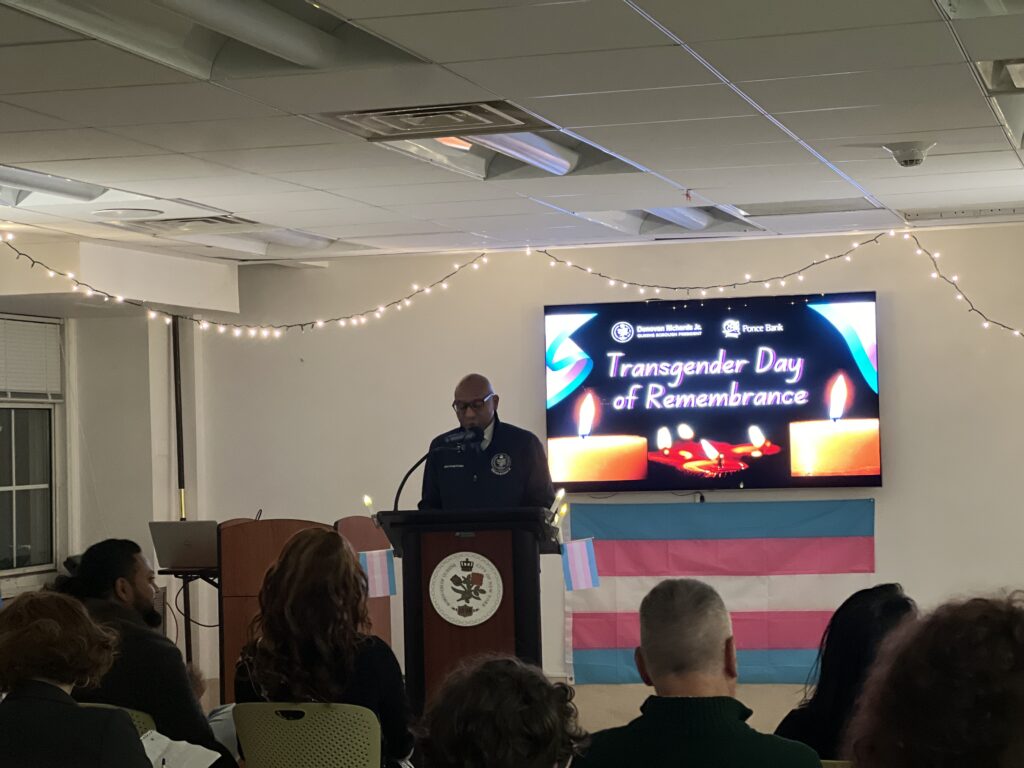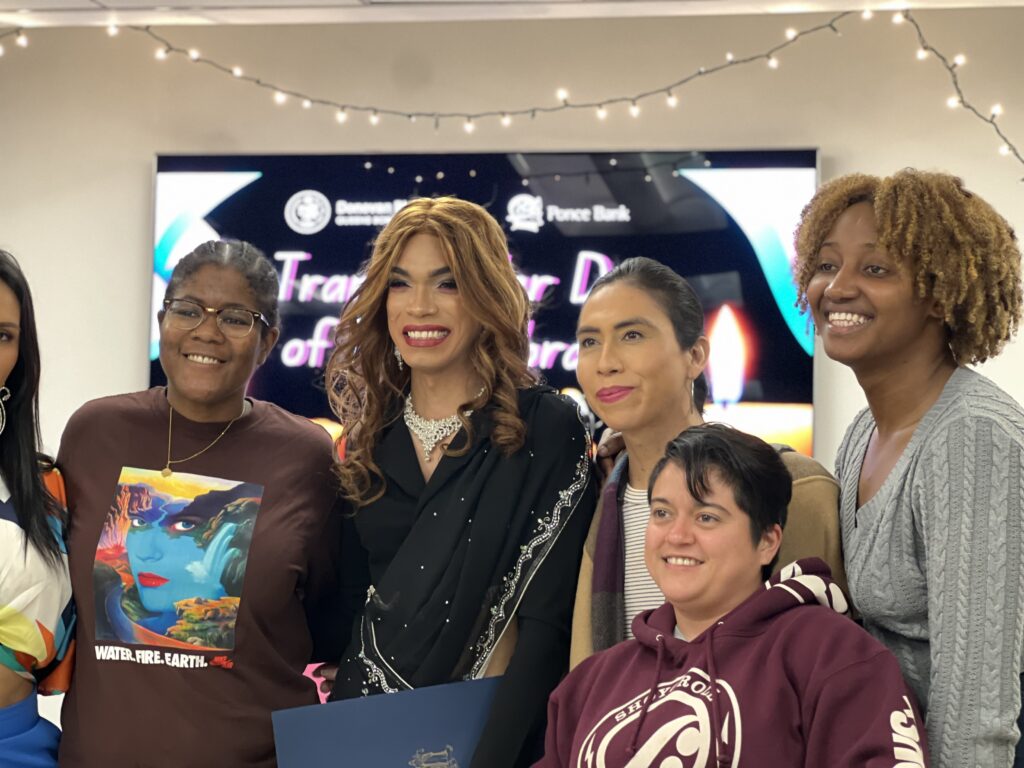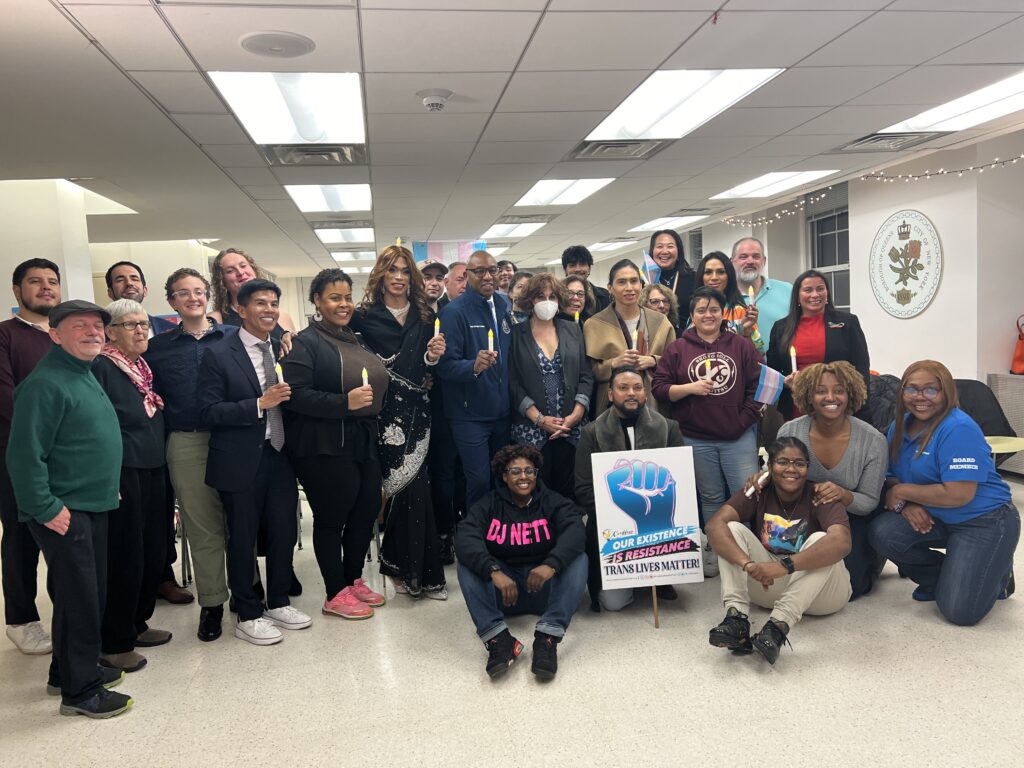By Celia Bernhardt | cbernhardt@queensledger.com
LGBTQ flags, string lights, electric candles, and snacks welcomed attendees at Queens Borough Hall’s Transgender Day of Remembrance gathering.
Held on a blustery evening on Nov. 21, the event drew about two dozen people. Borough President Donovan Richards and multiple Queens-based LGBTQ activists spoke to the crowd, reflecting on the tidal wave of anti-transgender policy and rhetoric that the year had brought.
“Transgender community, as I say every year, we see you, we love you, and we will forever fight alongside you,” Richards said to the crowd. “And we don’t do that simply in words here. That’s why we open the doors here at Borough Hall. Not everybody was doing this, but we do it because we truly value you.”

BP Richards speaks to the crowd.
Transgender Day of Remembrance, observed annually on Nov. 20, was started in 1999 by activist Gwendolyn Ann Smith. The day is meant to commemorate transgender people who lost their lives to anti-transgender violence. Transgender individuals, and especially Black transgender women, face disproportionately high rates of violence and abuse.
South Ozone Park resident Olivia Valawaa, a Community Advocate with the southeastern-Queens-based Caribbean Equality Project, also took to the podium.
“I am an Indo-Caribbean transgender woman from Guyana,” Valawaa said to the crowd. “I migrated to New York City in 2018 due to discrimination, lack of access to employment protection, and family abandonment.”
Valawaa continued, recounting her story. “I first experienced homophobia because of my queerness and femininity growing up in Guyana. I’ve escaped a toxic relationship and survived intimate partner violence from the one person who I thought would’ve kept me safe,” she said. “Due to a lack of human rights laws and protection for LGBTQ+ people in Guyana, I knew I wasn’t safe in my beautiful country. And if I wanted to live, I had to leave my state.”

Olivia Valawaa second from left. Photo credit: Celia Bernhardt
Valawaa explained that she dealt with suicidal thoughts while struggling through the visa process, but held on to the knowledge that her life was worth living. She was finally given a visitor’s visa, allowing her to relocate and begin a new life. She expressed appreciation for the Caribbean Equality Project for being a particularly valuable resource for LGBTQ members of the Caribbean immigrant communities that call southeastern Queens home.
Another speaker was James Austin, a Program Assistant at Queens Center for Gay Seniors in Jackson Heights and alum of Generation Q Youth Center in Forest Hills (both centers are run through the nonprofit Queens Community House).
“As I stand here, consumed by anger and unknowing, my thoughts turn to those we’ve lost,” Austin said at the podium. “To our beautiful siblings, you fought relentlessly to be your true selves; to know a life full of joy and pride in spite of a world unprepared for such power. The void you’ve left behind is immeasurable, and the ache of your absence reverberates in our shared silence. May you rest in power and pride. As a community, we will remember your names. We will not let your deaths erase you.”
Speaking to the Queens Ledger after the event, Austin explained the challenges that older LGBT Queens residents face.
“Queens is a very disconnected borough,” Austin said, citing a lack of intra-borough public transportation. “It really needs to have more community outreach: people in the streets, small communities with people in their neighborhoods, starting up space for their LGBTQ community around them and then getting connected in some way.”

BP Richards and attendees from the night.
Austin mentioned that the Queens Center for Gay Seniors, the only center of its kind in the borough, had to pay for one elder’s taxi rides because there was no other way for him to get to Jackson Heights. This disconnect across distance in the borough compounds already-existing issues of loneliness among older LGBT adults, Austin said. “Isolation is a huge issue that all older adults are dealing with—especially LGBT older adults, because our support systems aren’t, like, family or kids. A lot of people’s support systems are their friends, the people around them—that means that as you get older, your support system tends to dwindle.”
After several other speakers addressed the crowd, an emotional drag performance to Christina Aguliera’s “Beautiful” by Queens native Eiby Leandra closed out the night.
“Tonight was great. Tonight was very significant. It was so amazing, especially for me to get to tell my story for the very first time,” Valawaa said, reflecting on the event. “Although it’s an event to remember transgender people who lost their lives, it’s also a great time to really celebrate the people we have lost within our community. So it’s a bittersweet moment.”


